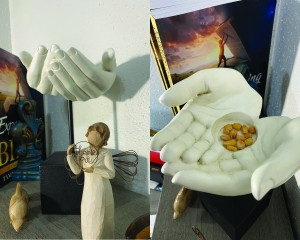
How few, like thee, inquire the wretched out,
And court the offices of soft humanity!
Rowe
Charity Rodman was born in Newport, Rhode Island in the year 1765. Her father was a sea-captain, and died at Honduras while she was in infancy. She married Thomas Rotch, of Nantucket, Massachusetts, on the sixth of June, 1790. Soon afterwards the Rotch family removed to New Bedford, where they have since distinguished themselves by their energy and uprightness of character, and their success in the mercantile business, being extensively engaged in the whale-fishery. Of some of them, as traffickers, it may be said, as it was of the merchants of Tyre in the days of her glory: “they are among the honorable of the earth.”
About the year 1801, Mrs. Rotch removed with her husband to Hartford, Connecticut, where she remained till 1811. She then, in a feeble state of health, and for its improvement, accompanied her husband on a journey through Ohio, and other parts of the West. The mildness of the winter was favorable to her constitution, and, restored to comfortable health, she returned to Hartford in the early part of the next summer. The following November she removed to Kendol, in Stark county, Ohio, near the site of the present village of Massillon.
There the mind of Mrs. Rotch, coöperating with the long cherished wishes of her heart, originated and matured plans for the establishment of a “school for orphan and destitute children.” Having traveled much, she had made extensive observations; and with an eye always open to the condition and wants of human kind, she early and often felt the force of a remark once made to her by an English friend: “That there were a great many children wasted in this country” -a painful truth, but no less applicable to Great Britain than to the United States.
Her husband died in 1823, and bequeathed to her, during life, his large and entire estate. His personal property was left in her hands to be disposed of as her philanthropic heart might dictate. This formed the basis of the school-fund which she left, and which, four or five years after her death, which occurred on the sixth of August, 1824, amounted to twenty thousand dollars. The interest of this sum has since purchased a farm of one hundred and eighty-five acres, one and a half miles from the village of Massillon, and erected, at a cost of five thousand dollars, a large brick edifice for educational and dwelling purposes which has been open seven years and which sustains forty pupils. The real and personal estate of the institution, is now estimated at thirty-five thousand dollars.
A class of ten pupils enter annually and remain four years. The school is established on the manual labor plan; and the boys are thoroughly instructed in the art of husbandry, and the girls in culinary duties and the manufacture of their own wearing apparel. Children enter between the ages of ten and fourteen, hence the youngest leave as advanced in life as their fifteenth year, a period when their habits of industry and their moral principles usually become too well established to be easily changed.
This school, founded by the benevolence of a single individual – a devout, yet modest and quiet member of the Society of Friends – is destined to become a source of inestimable blessings. Every half century, five hundred otherwise neglected plants in the garden of humanity, will there be pruned and nurtured, and strengthened for the storms of life; and many of them will doubtless be fitted to bear fruit here to the glory of God, and be finally transplanted to bloom in eternal youth in the gardens above.
The offspring of Christian philanthropy, the school will stand as a lasting memorial of woman’s worth. The highest ambition of its founder was to be a blessing to those who should come after her; and it may be said that while she did not live in vain, neither did she die in vain. Her death threw a legacy into the lap of orphanage, the benignant influence of which will long be felt.
The grave of Mrs. Rotch is overlooked by the monument of her munificence, but no marble nor enduring object marks the spot. Virtues like hers neither crave nor need chiseled words of praise; they are engraved on the hearts of the succored, to be remembered while those hearts continue to beat; and the feet of befriended children will keep a path open to the grave of their foster-mother, for ages.
* Some of the facts embodied in this article were gathered by the author while on a visit to Massillon, Ohio, in the summer of 1847, and were communicated to the public at that time through the columns of the Western Literary Messenger; others were lately and very obligingly furnished by Dr. William Bowen, of that place.
______
Excerpted from Noble Deeds of American Women
(Patriotic Series for Boys and Girls)
Edited by J. Clement
——
With an Introduction by Mrs. L. H. Sigourney
Illustrated
BOSTON: Lee and Shepard, Publishers
Entered by Act of Congress, in the year of 1851,
by E. H. Derby and Co., in the Clerk’s Office of the Northern District of New York
______
